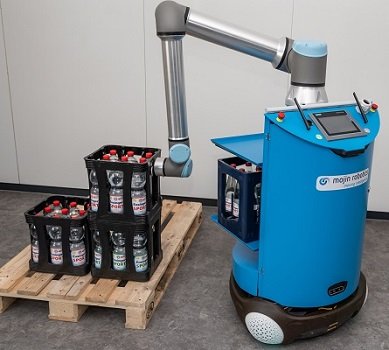
Views: 7
– Fraunhofer IPA is working in three projects, the project partners are developing AI-based applications to meet the needs identified in the areas of process monitoring, machine operation and beverage logistics.
Minapim by Hernan Valenzuela: Fraunhofer IPA is involved in 3 out of 44 projects supported by the Ministry of Economy, Labor and Housing for the state of Baden-Württemberg. Together with small and medium-sized enterprises (SMEs) in the region, IPA researchers are developing new AI-based procedures for a variety of application cases. This includes more efficient system process monitoring, the transformation of machines into self-learning applications and the automation of beverage logistics.
This activity is part of the “AI Innovation Contest”. The purpose of the projects and the competition in general is to overcome the technological obstacles in the commercialization of AI and to put into practice the methods that use it.
Virtual sensors for process monitoring: ViSKI
Until now, the integration of high-resolution sensors to monitor processes in factories has always been an expensive and time-consuming process. Low-resolution sensors, which are integrated into machines within the process environment by means of rechargeable batteries, and which can provide readings using wireless interfaces such as Bluetooth, present an alternative.
However, as these do not provide sufficient quality or quantity of data for individual monitoring applications, the research projects are working on virtual sensors. Their goal is to raise the quality and quantity of data generated by low-resolution sensors to the level seen with high-resolution sensors using neural networks, that is, machine learning methods. The current focus of the project is wood machining.
Self-learning and self-explanatory machines for intuitive machine operation: SLEM
Often, specialists are required for the installation, maintenance and reconfiguration of machines. Therefore, this project aims to develop an assistance system that allows all employees to operate a machine, even without great previous experience.
Using AI-based analysis of the sensor and the machine’s internal data, the device is able to recognize the machine status and the operator’s intention. Another AI module, which uses machine learning processes, develops logical operating options using the combined data.
The machine recognizes when the user is operating incorrectly and can alert you. The aim of the project is to transform each machine into a self-learning and self-explanatory system component. A leveling machine and filling machine serve as initial prototypes.
Robotic warehouse workers for beverage logistics: Luka-Beverage
Carrying crates of drinks here, there and anywhere will evidently be expensive and far from an ergonomic task – especially when it is part of someone’s daily work. With about 530 million beverage crates in circulation across Europe, there are many ways to help here. That is why the partners of the “LukaBeverage” project are working on a service robot to help with this task.
However, dynamic, narrow and unstructured environments, such as those found in beverage warehouses, represent a challenge when finding an automated solution. In addition, service robots have so far only managed to lift weights up to 20 kg on rare occasions.
Thus, the objective of the project is to develop a loading system suitable for the mobile platform “Luka”, Which was developed by the company Mojin Robotics and already exists as a prototype. Using AI processes to locate objects, the robot knows exactly where the boxes and bottles are located, even in such a challenging environment.
With this knowledge, he is able to plan how to grab these objects. In addition, a 3D navigation system is created, thanks to which the robot can orient itself autonomously and also partially creates a 3D map of the free working area. As a result, the robot and its arm can move without collisions, even without a sensor to alert you to possible obstacles.
The objective of the project is, until the end of this year, to develop the prototype so that it uses the sensing technology to carry out palletizing and depalletizing tasks, in addition to being able to stack beverage crates and handle empty bottles. In doing so, this would illustrate the technical and economic feasibility of automated solutions like “Luka” for beverage logistics.
Expert contact for the ViSKI project: Simon Kleinhenz – Fraunhofer-Institut für Produktionstechnik und Automatisierung IPA – Nobelstr. 12 70569 Stuttgart/Germany
Expert contact for the SLEM project: Christian Jauch
Expert contact for the Luka-Beverage project : M.Sc. Richard Bormann
Source: Fraunhofer IPA
Related article: Massive expansion of artificial intelligence research at TUM